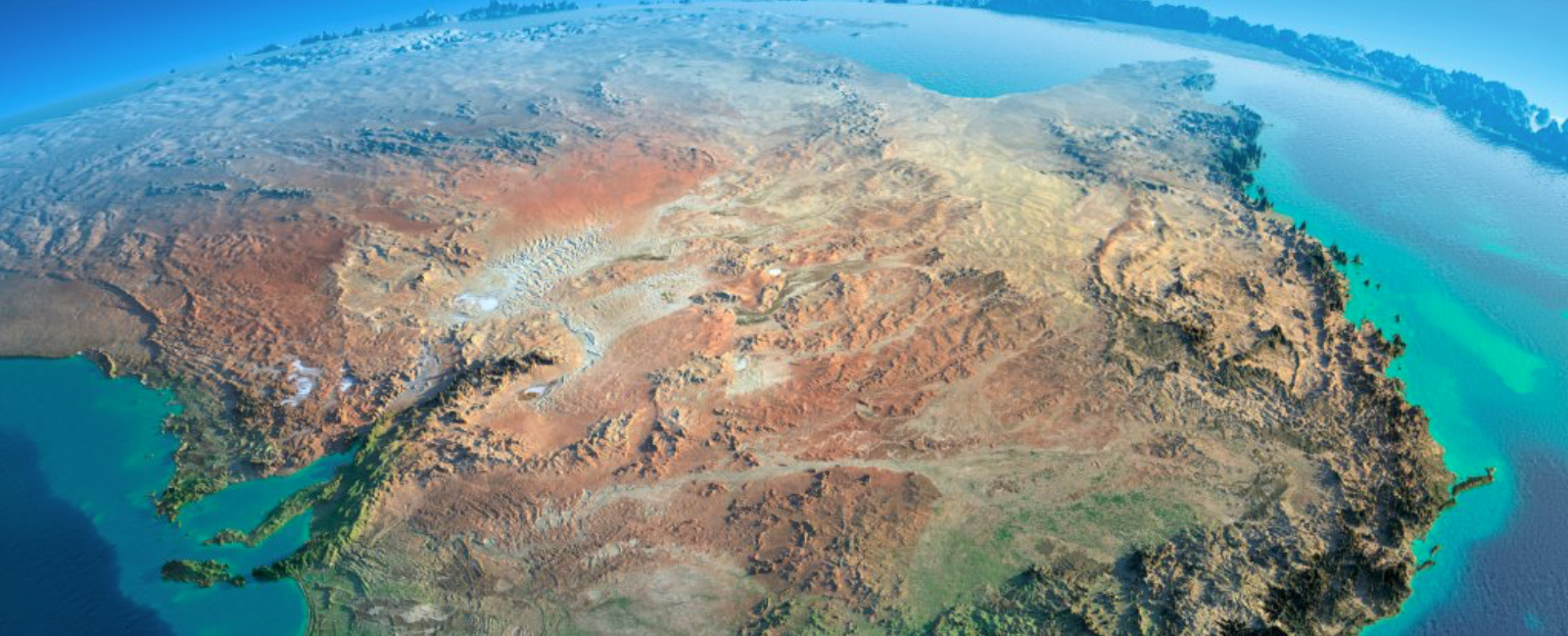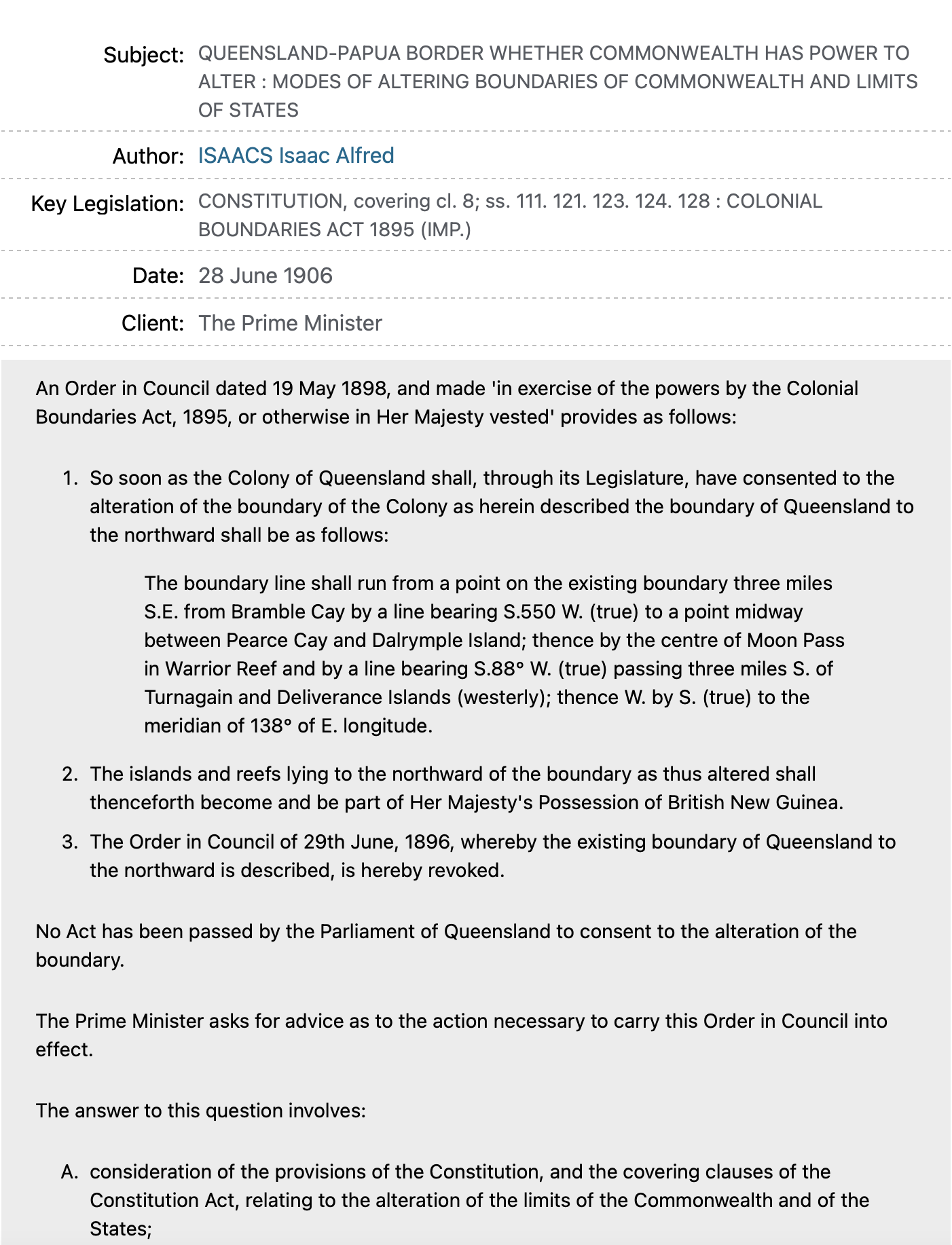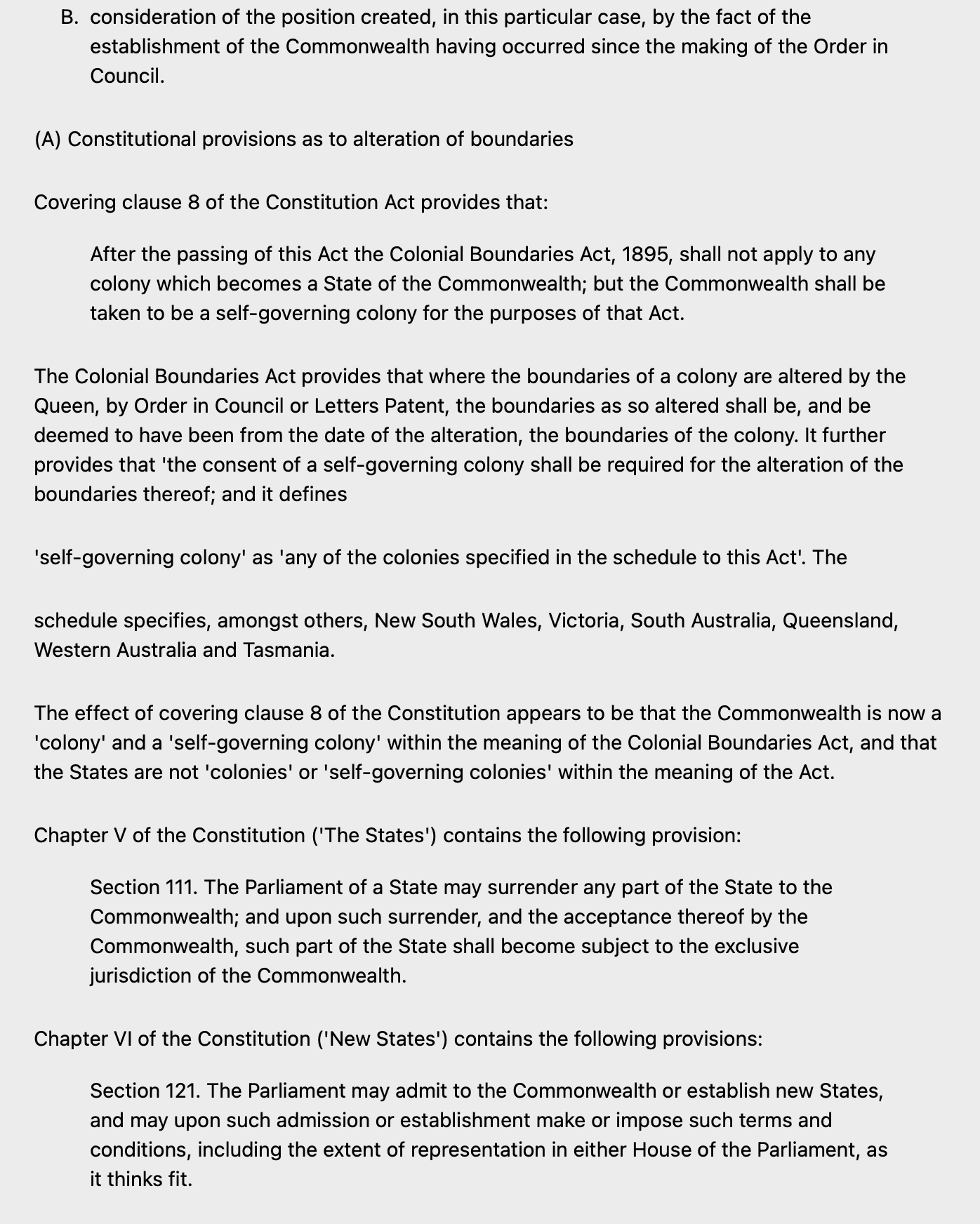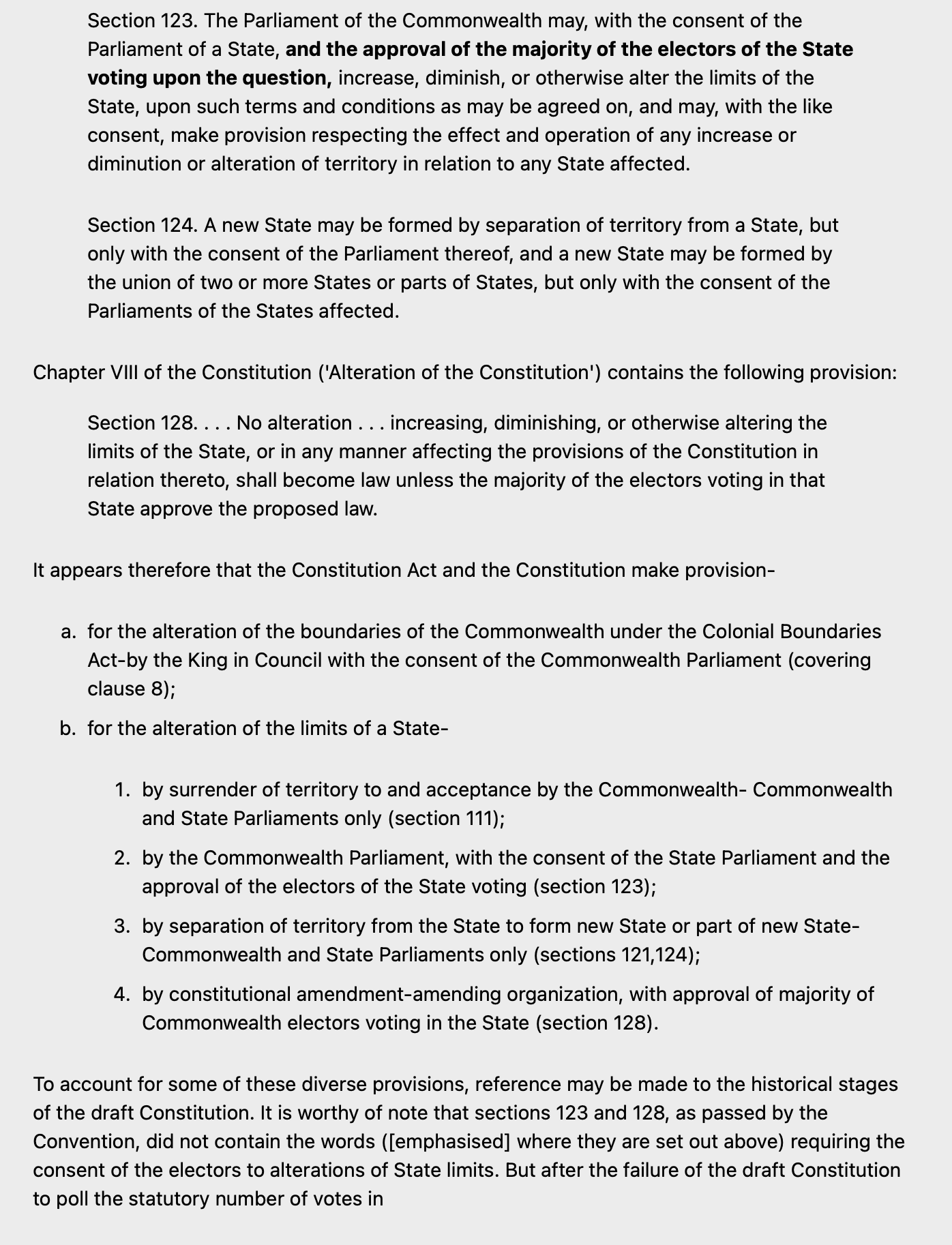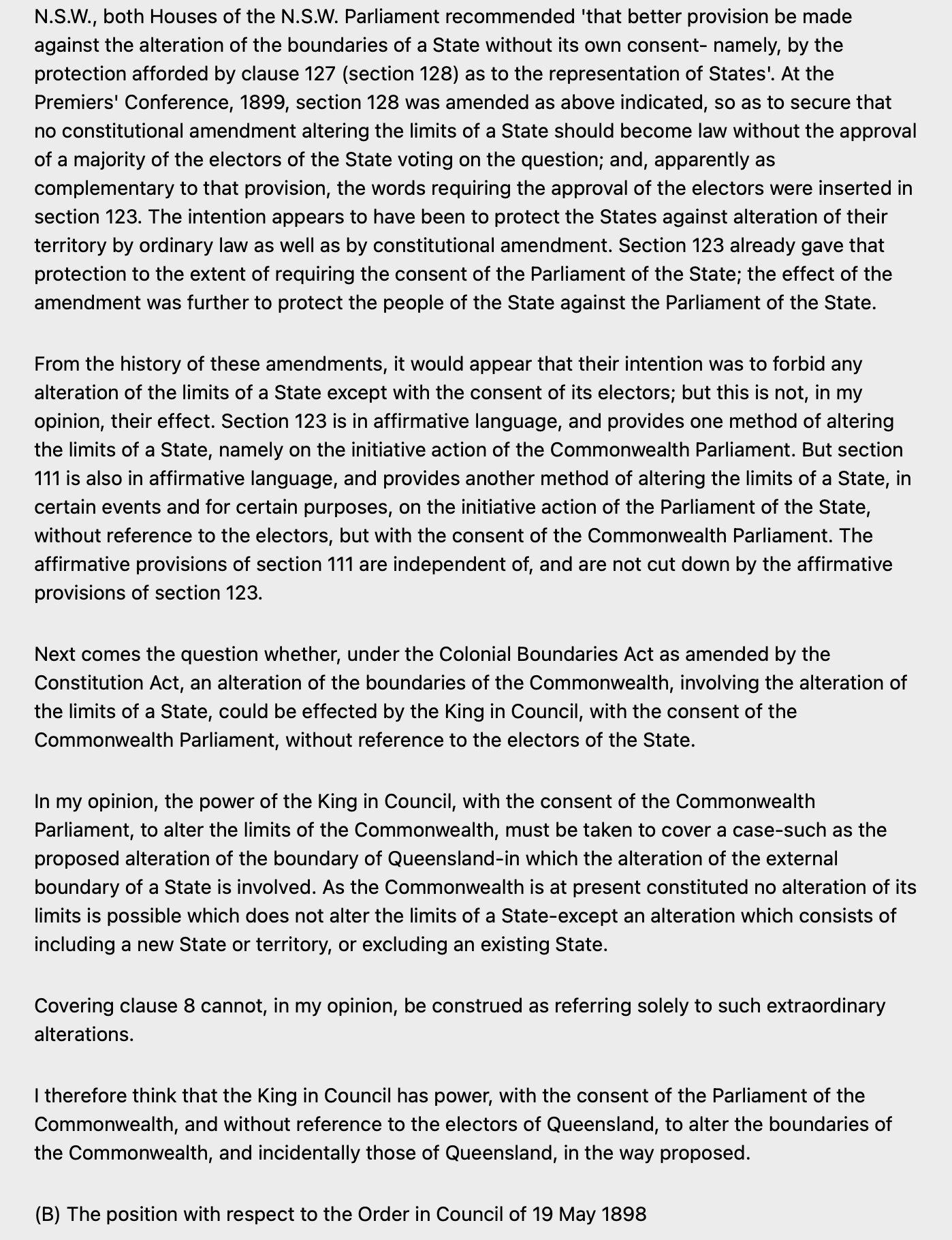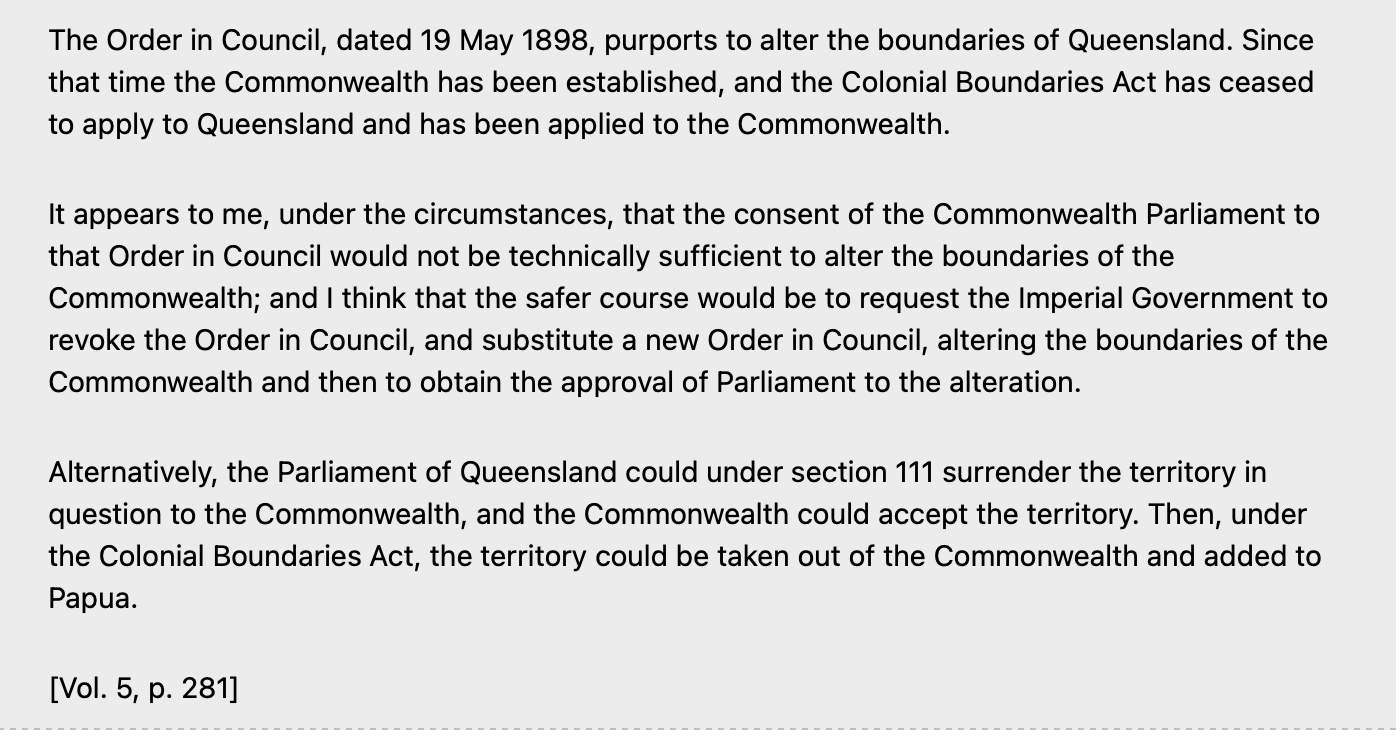The Annotated Constitution ~ Quick & Garren
Application of Colonial Boundaries Act. (58 and 59 Vic. c. 34.)
- After the passing of this Act the Colonial Boundaries Act, 1895 49, shall not apply to any colony which becomes a State of the Commonwealth; but the Commonwealth shall be taken to be a self governing colony for the purposes of that Act.
HISTORICAL NOTE.—At the Melbourne Session of the Convention, after the first report, this clause was proposed by Mr. O'Connor in precisely the form in which it now stands. (Conv. Deb., Melb., pp. 1,826-7.)
¶ 49. “Colonial Boundaries Act.”
This is an Act to provide, in certain cases, for the alteration of the boundaries of self-governing colonies. It provides as follows:—
(i.) Where the boundaries of a colony have, either before or after thepassing of this Act, been altered by Her Majesty the Queen by Order-in- Council or letters-patent, the boundaries as so altered shall be, and be deemed to have been from the date of the alteration, the boundaries of the colony.
(ii.) Provided that the consent of a self-governing colony shall be required for the alteration of the boundaries thereof.
(iii.) In this Act “self-governing colony” means any of the colonies specified in the schedule to this Act.
SCHEDULE.
SELF-GOVERNING COLONIES.
Canada. South Australia. New Zealand. Newfoundland. Queensland. Cape of Good Hope. New South Wales. Western Australia. Natal. Victoria. Tasmania.
The effect of this clause is to make the Colonial Boundaries Act apply, not to the separate States of the Commonwealth, but to the Commonwealth as a whole—just as it applies to the Dominion of Canada as a whole. In other words, the colonies which become States are in effect struck out of the schedule, and the Commonwealth of Australia is substituted.
The purpose of the Act is to confer general statutory authority on the Queen to alter the boundaries of a self-governing colony, with the consent of that colony, without the necessity of resorting to Imperial legislation in every case.
The reason for repealing the Act, so far as it applied to colonies which become States of the Commonwealth, is that the Constitution itself makes provision for the alteration of the boundaries of States. Sec. 123 provides that the Parliament of the Commonwealth may, with the consent of the Parliament of a State, and the approval of a majority of voters in the State, alter the limits of the State.
Now, therefore, the Colonial Boundaries Act only applies to the alteration of the boundaries of the Commonwealth. Apart altogether from that Act, the Commonwealth has power under section 121 to alter the boundaries of the Commonwealth by admitting new States; and sec. 122 contemplates, and perhaps impliedly gives, the power to accept or acquire new territories.
The first question is—What constitutes the consent of the Commonwealth within the meaning of the Colonial Boundaries Act? The consent of a colony is ordinarily given by its Legislature; and the consent here intended is evidently the consent of the Parliament of the Commonwealth. It may indeed be contended that by the Commonwealth, which is described in the Colonial Boundaries Act, as “a selfgoverning colony,” is meant the community; and that the consent of the community cannot be given either
[P.379]
by the Parliament of the Commonwealth or by the Parliaments of the States, or both, but only by the community in quasi-sovereign organization—i.e., by the amending power. This, however, was certainly not the intention of the framers of the Colonial Boundaries Act, or of the Federal Constitution; whatever may be the teachings of political science as to the seat of quasi-sovereignty in the Commonwealth. The consent of Canada under the Colonial Boundaries Act is clearly to be given by the Parliament of Canada; and the consent of the Commonwealth means the consent of the Parliament of the Commonwealth. That is to say, the word “Commonwealth” is used here as in other provisions as referring to the central governing organs of the Commonwealth. (See notes ¶ 17 and ¶ 43 “Commonwealth,” supra.)
Where the alteration of the boundaries of the Commonwealth involves merely territory which is not part of any State, the clause presents no further difficulty; but where it involves the alteration of the limits of a State, it becomes a question whether in addition to the consent of the Parliament of the Commonwealth, the consent of the Parliament and electors of the State is also necessary. The Colonial Boundaries Act, as amended by the Constitution Act, provides that Orders in Council, or letters patent, altering the boundaries of the Commonwealth, shall be valid if made with the consent of the Commonwealth; sec. 123 of the Constitution provides that the Parliament of the Commonwealth may, with the consent of the Parliament and a majority of the electors of a State, alter the limits of the State. The latter section certainly implies that the Parliament of the Commonwealth may not alter the limits of a State without such consent. The question is whether, in consenting to an alteration of boundaries by the Queen, the Parliament can be said to alter the limits of a State. Under sec. 123, the Parliament of the Commonwealth makes the alteration; under the Colonial Boundaries Act, the Queen makes the alteration, and the Parliament of the Commonwealth merely consents. It is certainly open to argument that the consent of the Commonwealth, in such a case, is in effect an alteration of the limits of a State by the Commonwealth, and therefore that the Parliament of the Commonwealth cannot lawfully give such consent without the consent of the Parliament of the State, and the approval of a majority of the electors.
Below is a legal advice given to the Prime Minister on the subject of the Colonial Boundaries Act 1895. Isaac Isaacs at age 75 was the first native-born Australian and the only Chief Justice of the High Court ever appointed to the role, and the first Governor-General in the Commonwealth, there is no mention of State Borders.
NEW SOUTH WALES v. THE COMMONWEALTH ;
(1975) 135 CLR 337
17 December 1975
34. There is another consideration which to my mind is significant. The Colonial Boundaries Act and, more importantly, s. 123 of the Constitution assume that the boundaries of the Australian colonies and subsequently of the States are fixed boundaries capable of alteration only in the manner prescribed.
445 MINUTE BY LINDELL
NAA: A5034, SRI973/2001
Attorney-General's Department, Canberra, 20 March 1973
Legal Relations with the United Kingdom–Colonial Relics
The matters listed below may be thought to represent the last remaining colonial links between Australia and the United Kingdom.
Federal
Application of (Imp.) Colonial Boundaries Act 1895 under which Australian boundaries may be altered by The Queen by Order in Council (i.e. The Queen acting with the advice of the Privy Council).
- –Act applies by reason of Covering Clause 8 of the Commonwealth of Australia Constitution Act which cannot be altered or repealed even by amendment of the Constitution under section 128.
- –Query whether the Act should be repealed having regard to its possible future use in relation to The Torres Strait Islands dispute.
